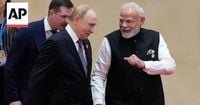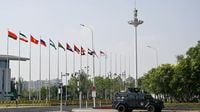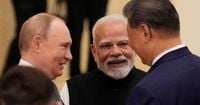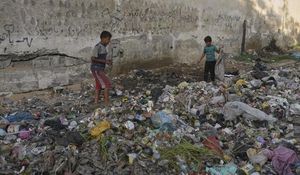In a striking demonstration of shifting global alliances, Chinese President Xi Jinping hosted leaders from more than 20 countries at the Shanghai Cooperation Organization (SCO) summit on September 1, 2025, in China. The gathering, attended by prominent figures such as Russia’s Vladimir Putin and India’s Narendra Modi, was marked by pointed critiques of Western policies and a clear push for an alternative, non-Western model of international cooperation.
The summit, which convened the heads of state of 10 member countries—China, India, Russia, Pakistan, Iran, Kazakhstan, Kyrgyzstan, Tajikistan, Uzbekistan, and Belarus—served as a platform for leaders to voice their frustrations with what they described as Western “bullying” and a lingering “Cold War mentality.” President Xi, in his opening remarks, minced no words. “The shadows of Cold War mentality, bullying, are not dissipating, and there are new challenges that are increasing, not diminishing,” he said, in a statement widely interpreted as a rebuke of the United States and its use of trade tariffs against Asian economic powerhouses. According to France 24, Xi went on to describe the current global situation as “chaotic and intertwined,” emphasizing the need for the SCO to “continue to follow the Shanghai spirit... and better perform the functions of the organisation.”
Xi’s comments set the tone for a summit that sought to position the SCO as a viable alternative to traditional Western-led alliances. The organization, founded in 2001, has grown in size and ambition, now touting itself as a non-Western style of collaboration. On Monday, the group signed a declaration committing to deeper cooperation in security and economic sectors, and admitted Laos as a new observer country, expanding its influence further across Eurasia.
The sense of unity among member states was on full display as leaders posed for a group photo on a red carpet, with Xi, Putin, and Modi seen chatting amiably, flanked by their translators. The camaraderie was further highlighted when Modi and Putin were photographed holding hands before engaging in nearly an hour of private conversation in Putin’s armored presidential car. “Conversations with him are always insightful,” Modi later posted on X, sharing a photograph of the two leaders together. He praised the “special and privileged strategic partnership” with Moscow and reiterated India’s desire for “stable peace” in the ongoing Ukraine conflict.
Russia’s President Putin, for his part, used his speech to defend his country’s military actions in Ukraine. He placed the blame for the three-and-a-half-year conflict, which has claimed tens of thousands of lives and devastated much of eastern Ukraine, squarely on the West. “This crisis wasn’t triggered by Russia’s attack on Ukraine, but was a result of a coup in Ukraine, which was supported and provoked by the West,” Putin declared, as reported by AFP. His remarks underscored Moscow’s ongoing narrative that Western interference, rather than Russian aggression, is to blame for the war.
Putin also took the opportunity to praise Turkey’s mediation efforts in the Ukraine conflict during a meeting with Turkish President Recep Tayyip Erdogan. Additionally, he met with Iran’s newly elected President Masoud Pezeshkian to discuss Iran’s nuclear program, signaling Russia’s intent to strengthen ties with other key regional players.
The summit’s significance was not lost on outside observers. Speaking with France 24, Robert Manning, Distinguished Fellow at the Global Foresight Hub and China Programme at the Stimson Centre, described the event as emblematic of a world seeking to “make itself America-proof, both in terms of new trade arrangements and new security arrangements.” Manning’s assessment captures the underlying motivation driving much of the SCO’s agenda: a desire among its members to insulate themselves from perceived Western economic and political pressures.
Ukraine, for its part, seized upon the occasion to urge China to play a more active role in seeking a peaceful resolution to the conflict. The country’s foreign ministry issued a statement from Kyiv expressing that they “would welcome a more active role” for Beijing to help find peace “based on respect for the UN Charter.” It remains to be seen whether China will heed this call, but the appeal highlights the complex web of interests and rivalries at play within the SCO.
Despite the outward displays of unity, underlying tensions between some member states were evident. India and China, the world’s two most populous nations, remain intense rivals, competing for influence across South Asia. Their relationship has been fraught, marked most notably by a deadly border clash in 2020. However, a thaw began last October when Modi and Xi met for the first time in five years at a summit in Russia. During the SCO summit, Modi told Xi that India was committed to advancing ties “on the basis of mutual trust, dignity and sensitivity,” signaling a cautious willingness to move past old grievances.
The timing of the summit was also notable. It began just days before a massive military parade in Beijing, scheduled for September 3, 2025, to commemorate the 80th anniversary of the end of World War II. Many of the assembled dignitaries, including North Korean leader Kim Jong Un—who left Pyongyang by train on September 1 and is expected to arrive in Beijing on September 2—will be in attendance. The parade serves as another stage for China to showcase its growing influence and military might to the world.
With more than 20 leaders in attendance, this year’s SCO summit was the largest since the organization’s founding. The gathering’s scale and ambition underscore a broader trend: as the world becomes increasingly multipolar, groups like the SCO are gaining prominence as forums for non-Western countries to coordinate strategies and assert their interests on the global stage.
As the summit concluded, the member states’ declaration to strengthen cooperation in security and economic sectors signaled their intent to chart a course independent of Western dominance. Whether this vision will translate into concrete action remains to be seen, but one thing is clear—the world’s geopolitical landscape is shifting, and the SCO is determined to play a leading role in shaping what comes next.






